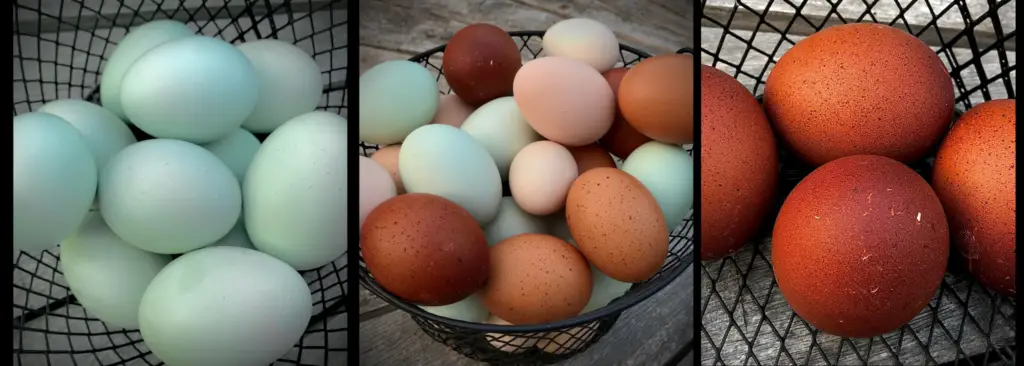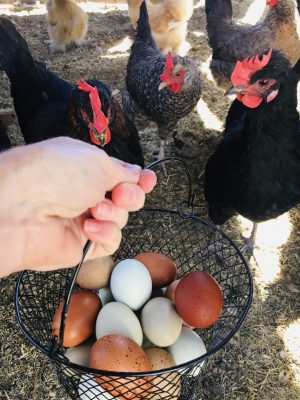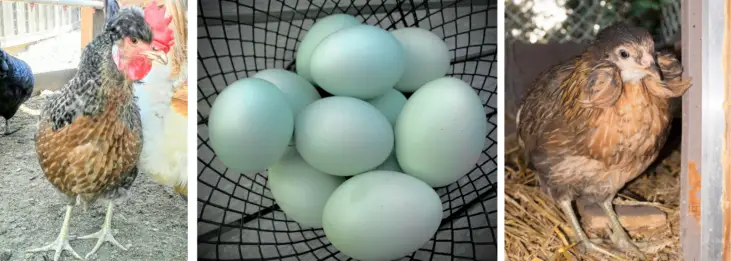

Increases egg laying naturally.
- Improves chicken health.
- Deters parasites: mites, lice, fleas & flies as well as mice, rats, raccoons, coyotes, opossums and more!
- On SALE!
- Shop: Nesting Box Herbs
Looking to add some color to your daily egg collection baskets? How about adding some varying shades of blue chicken eggs to your basket? These are the 6 best breeds that will lay beautiful blue chicken eggs!
| BREED | EGGS/YEAR | EGG SIZE/COLOR |
|---|---|---|
| AMERAUCANA | 200 | LARGE, BLUE |
| CRESTED CREAM LEGBAR | 260 | LARGE-XL, BLUE,BLUE-GREEN |
| EASTER EGGER | 250-300 | LARGE-XL, BLUE,GREEN, PINK |
| ARAUCANAS | 150-200 | MEDIUM-LARGE, LIGHT BLUE |
| WHITING TRUE BLUE | 280-300 | MEDIUM-LARGE, POWDER BLUE |
| ARKANSAS BLUE | 250-350 | LARGE, BLUE |
#1 Ameraucana – “Chipmunk Cheeks and Slate Legs”
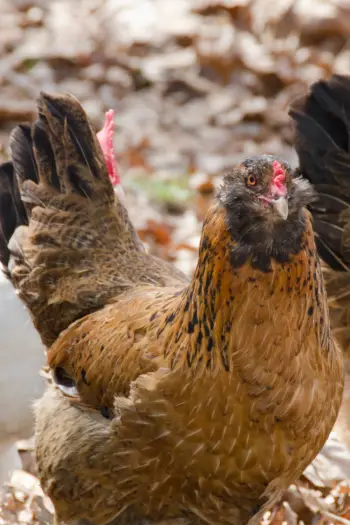
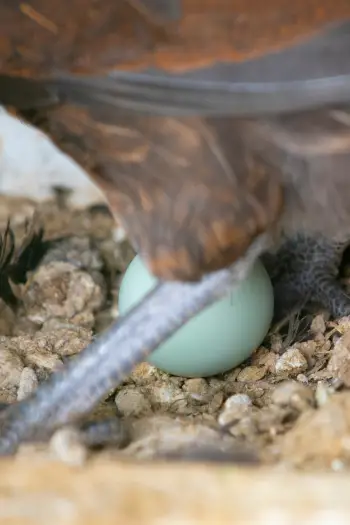
The Ameraucana breed originated in the United States in the 1970’s and was created in the hopes of preserving the genetics of the Araucana chicken, another blue egg layer. A true Ameraucana only lays blue eggs and has slate blue legs. If the hen isn’t laying a blue egg, it isn’t a true Ameraucana.
| HIGHLIGHTS OF AMERAUCANA BREED |
|---|
| LAYS LIGHT BLUE EGG |
| BEGINS LAYING ABOUT 5 MONTHS OF AGE |
| LAYS 3-4 EGGS PER WEEK |
| EGGS MEDIUM-LARGE |
| STANDARD SIZE 5 1/2 HENS, 6 1/2 LBS ROOSTERS |
| BANTAM SIZE IS PRETTY SMALL AT ABOUT 2 LBS |
| PEA COMB |
| COLD HARDY |
| SLATE BLUE LEGS |
| 8 DIFFERENT COLORS |
| RECOGNIZED COLORS OF AMERAUCANA |
|---|
| WHITE |
| BLUE |
| BLACK |
| BUFF |
| SILVER |
| WHEATEN |
| BLUE-WHEATEN |
| BROWN-RED |
#2 Crested Cream Legbar – “Adorable Feathered Crests”
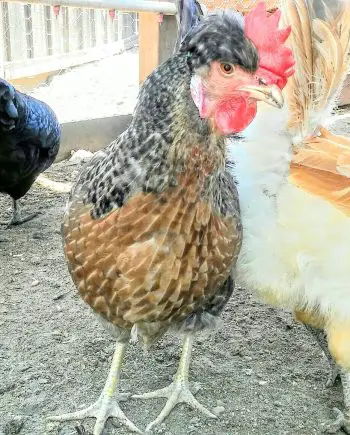
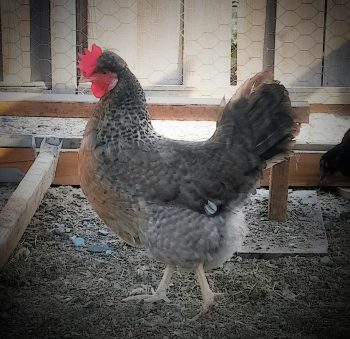
What do you get when you cross a Barred Plymouth Rock with a Brown Leghorn(with a little bit of Araucana and Gold Campine genes)? You get a Cream Legbar Chicken!
The Crested Cream Legbar gets its adorable crest of feathers on its head from the genes of the Araucana and the high egg laying ability from the Brown Leghorn genes.
The Crested Cream Legbar is a British chicken breed and is about 100 years old. It has only been in the United States for a short period of time, but is becoming more and more popular for backyard chicken owners.
It is the most popular auto sexing chicken breed. Right when the chicks are born you are able to sex them.
The female chicks have a chipmunk pattern, with a dark stripe down its back and by its eyes. The males do not have the chipmunk pattern and their coloring is more washed out. The males also have a white spot on the top of their head.
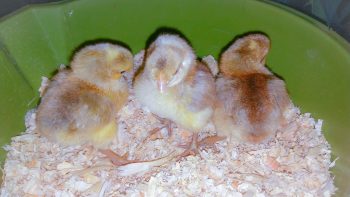
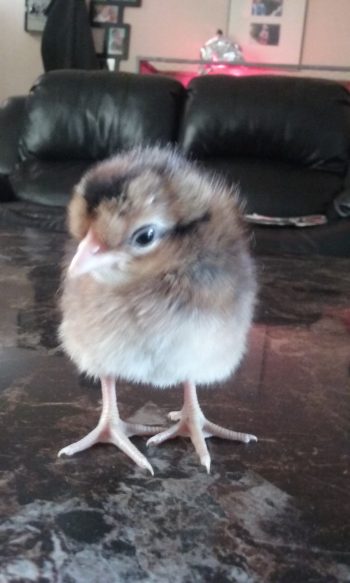
| HIGHLIGHTS OF CRESTED CREAM LEGBAR BREED |
|---|
| LAYS LIGHT BLUE OR BLUE-GREEN EGG |
| LAYS ABOUT 4-5 EGGS PER WEEK, 260/YEAR |
| LAYS LARGE – XL EGGS |
| FAMILY FRIENDLY |
| AUTO SEXING |
| STILL CONSIDERED A RARE BREED IN U.S. |
| YELLOW LEGS |
| HEN WEIGHS 4 1/2 – 6LBS, ROOSTER: 6-7 1/2 LBS |
#3 Easter Egger – “Most Popular Family Chicken”

Easter Egger chickens are the most known for their wide variety of egg colors the breed can lay. They can lay various shades of blue or green and less commonly pink eggs!
This breed is not a standard breed, but a mix of either an Ameraucana or Araucana with another breed. This is why there is such a variety of egg colors associated with the breed.
It isn’t uncommon for backyard chicken owners to own 4-6 Easter Eggers to provide their family with a really nice, colorful daily collection of eggs!
| HIGHLIGHTS OF EASTER EGGER BREED |
|---|
| LAYS SHADES OF BLUE, GREEN AND EVEN PINK EGGS |
| NOT A STANDARD BREED – “MIXED BREED” |
| EXTREMELY FAMILY FRIENDLY, CUDDLY |
| WIDE VARIETY OF COLORS |
| LAYS 5 EGGS PER WEEK |
| LAYS LARGE-XL SIZE EGG |
| COLD AND HEAT HARDY |
| WEIGHT HEN- 4 LBS, ROOSTER- 5 LBS |
#4 Araucanas – “Rumpless with Ear Tufts”

The Araucana breed originated in Chile and carries a lethal ear tuft gene that very commonly kills the chick embryo before it even hatches. 4 out of 10 embryos die around day 20-21 and a higher than average percentage that make it to hatch will die within a week of hatching.
Araucanas have “peduncles” or protuberances that stick out from the side of its neck or ears lobes that are often covered with ear-tufts (feathers).
Because the ear tuft gene is a semi-lethal gene, it is not common to see an Araucana with ear-tufts.
Another characteristic that makes this breed stand out is that it is rumpless. It doesn’t have tail feathers that protrude out and it lacks a tail bone. This makes it easy to differentiate between an Ameraucana, Easter Egger and the Araucana. Especially if the Araucana does not have ear tufts.
If you are lucky enough to own an Araucana, you may be blessed with some pretty different shades of blue eggs. Some people have reported getting greyish blue, purplish blue and turquoise green eggs from their Araucana!
| HIGHLIGHTS OF ARAUCANA BREED |
|---|
| EGGS: VARIOUS SHADES OF BLUE |
| LAYS 150-200 EGGS/YEAR |
| CARRIES LETHAL EAR TUFT GENE |
| DIFFICULT TO BREED |
| RUMPLESS, NO TAIL BONE |
| PEA COMB |
| NO WATTLES |
| DUAL PURPOSE: EGGS AND MEAT |
| HEN: 5-6 LBS, ROOSTER: 6-7 LBS |
| BANTAM SIZE: HEN: 1.5-1.75 LBS, ROOSTER: 1.75 LBS-1.87 LBS |
| BROODY, EXCELLENT MOTHERS |
| DOCILE BREED |
| APA RECOGNIZED COLORS OF ARAUCANA |
|---|
| WHITE |
| BLACK |
| BLACK BREASTED RED |
| GOLDEN DUCKWING |
| SILVER DUCKWING |
#5 Whiting True Blue – “Prolific and Consistent Layer”
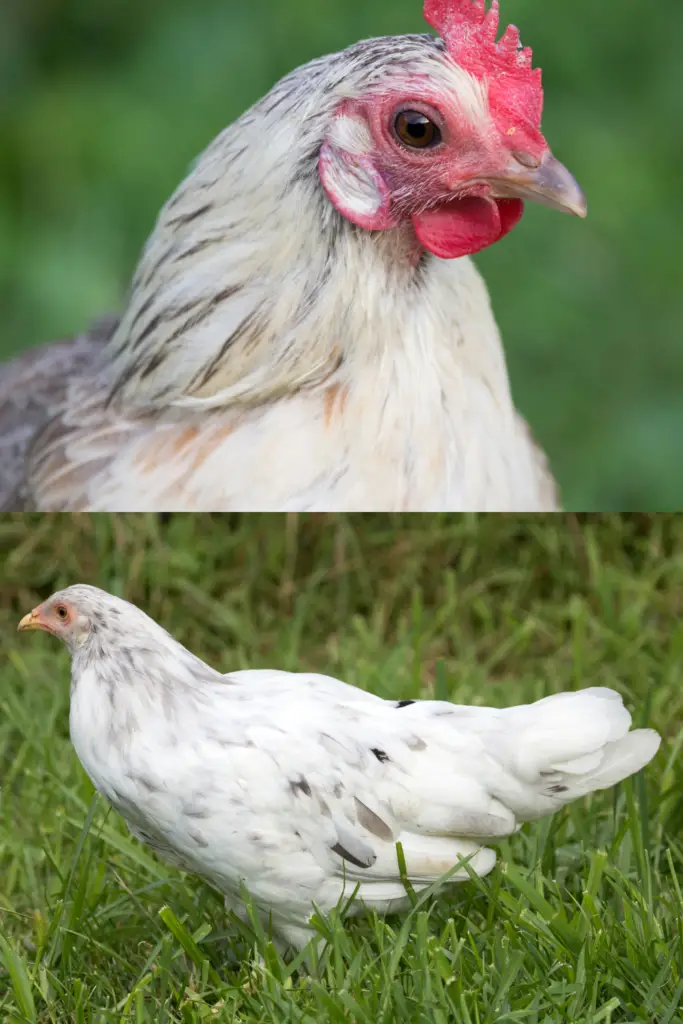
The Whiting True Blue breed was developed by Dr. Thomas Whiting in western Colorado at a place they call Whiting Farms. The main goal at Whiting Farms began in 1989 to be the number one producer of fly tying feathers (for fishing). Right now Whiting Farms is the number one fly tying feather market in the world!
On top of providing beautiful tying feathers for fly fishing, the Whiting True Blue also lays a beautiful, powder blue colored egg!
| HIGHLIGHTS OF WHITING TRUE BLUE BREED |
|---|
| LAYS POWDER BLUE EGG |
| LAYS 280-300 EGGS |
| EGG SIZE: MEDIUM-LARGE |
| VARIETY OF FEATHER COLORS |
| BEGIN LAYING 5 MONTHS |
| FRIENDLY, NON-AGGRESSIVE |
| FEATHERS COMMONLY USED FOR FLY FISHING AND CRAFTING |
| SIZE: 5.5-7 LBS |
#6 Arkansas Blue – ” Experimental Breed”
The Arkansas Blue chicken is an experimental chicken created by Dr. Keith Bramwell at the University of Arkansas. He bred a Leghorn with an Araucana resulting in a blue egg laying hen that is called an “Arkansas Blue.”
Because of the Leghorn gene, they are prolific layers! They lay a beautiful blue medium-large egg about 300/year!
| HIGHLIGHTS OF THE ARKANSAS BLUE |
|---|
| LAYS BLUE EGGS |
| LAYS 300 EGGS/YEAR |
| EGGS MEDIUM-LARGE |
| PEA COMB |
| YELLOW LEGS, SKIN |
| FLIGHTY BREED |
| STARTS LAYING AROUND 5 MONTHS |
| HEAT AND COLD HARDY |
| WEIGHT: HEN-5.5 LBS |
What Determines the Color of an Egg Shell?
Genetics determines the color of an egg shell that a hen produces. The breed of the chicken will determine how much of each pigment (color) is deposited onto the egg shell, inside the hens oviduct. Pigments responsible for egg color are protoporphyrin IX, biliverdin, and biliverdin-zinc chelate.
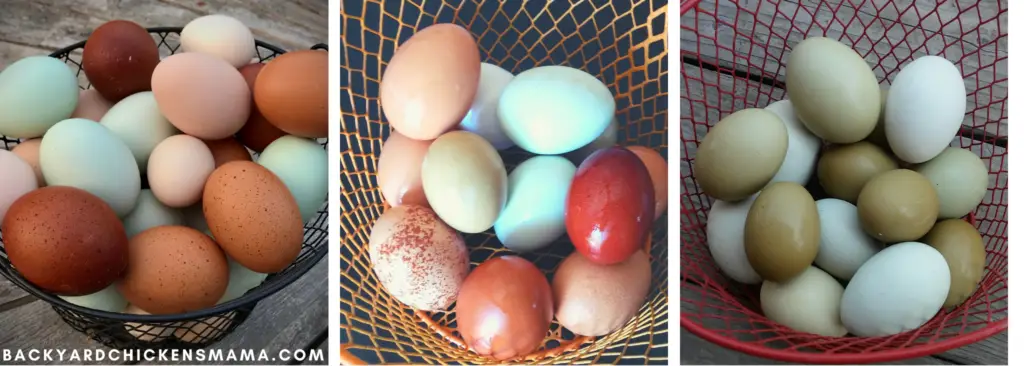
Biliverdin is responsible for giving eggshells their blue-green color and protoporphyrin the reddish-brown color. There are endless different shades of blues, greens and browns produced, depending upon how much of each pigment is deposited.
All eggs start out as white and take approximately 26 hours to develop. Breeds that lay white eggs, such as the Legbars, Andalusians and Anconas do not have any pigment deposited. Even though no pigment is deposited, it still spends the same amount of time in the oviduct as a blue, green or brown egg.
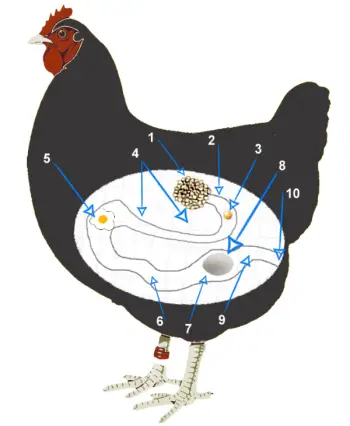
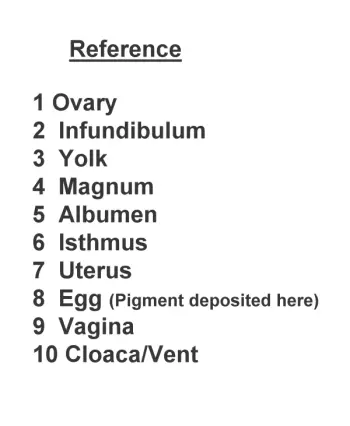
Pigment Responsible for Blue Eggs
Breeds that produce blue eggs, such as Ameraucana, Araucana or Crested Cream Legbars have a pigment called oocyanin and biliverdin deposited while in the oviduct. This pigment permeates the entire egg shell. This is why both the inside and outside of the egg shell have a blue color.
Pigment Responsible for Brown Eggs
Breeds that produce brown eggs, such as Marans, Orpingtons and Rhode Island Reds, have a pigment called is protoporphyrin IX. The darker the egg shell, the more pigment is deposited.
Brown egg layers have most of the pigment deposited during the last hours before being laid. Most of the pigment in brown eggs is deposited in the “bloom.” This is why the inside of brown eggs is still white and just the outer shell is brown.
Because most of the pigment of brown eggs is in the bloom, it can easily be wiped or scratched off, especially when the egg is just laid and the bloom is still wet.
Pigment Responsible for Green Eggs
Breeds that produce green eggs, such as Olive Eggers, Isbars and Easter Eggers have a cross of pigments responsible for both blue and brown egg shells. Again, the breed will determine how much of each pigment is released.
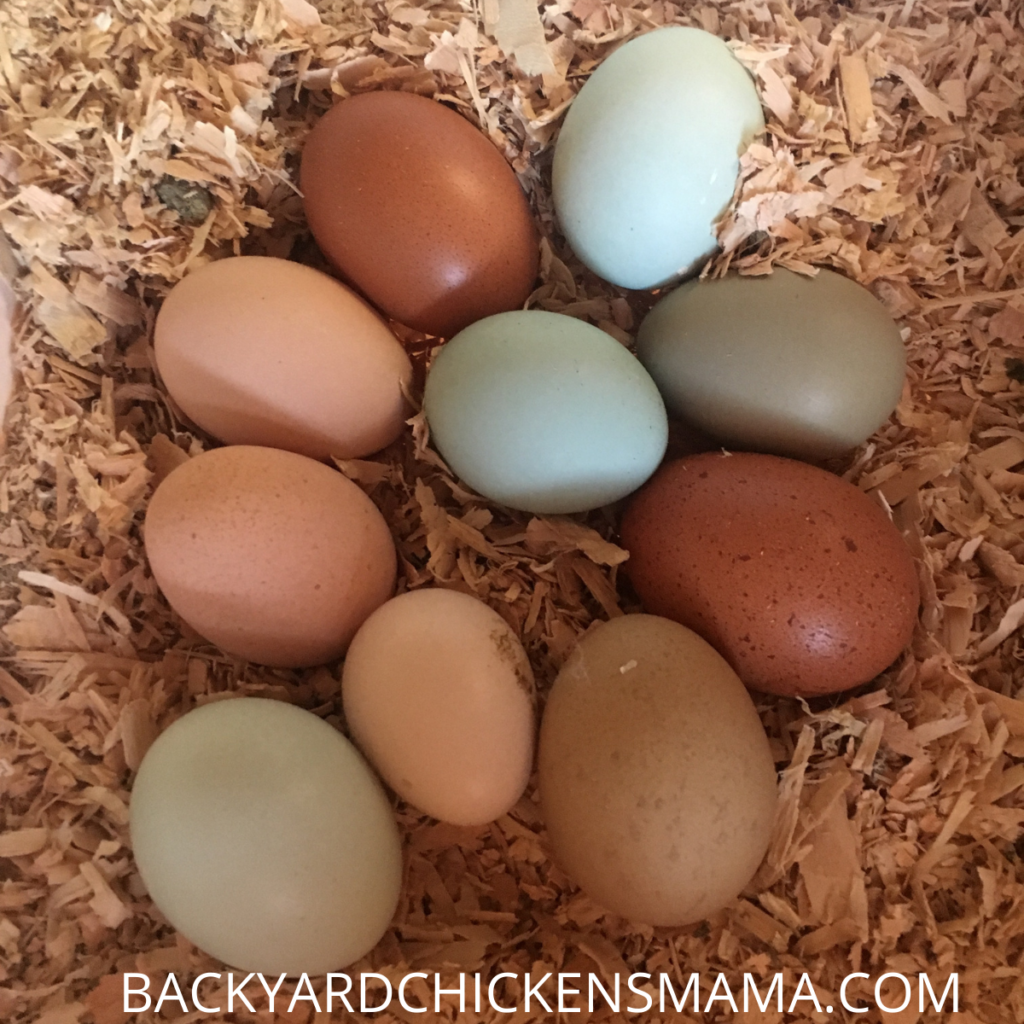
Can One Chicken Lay Multiple Colors of Eggs?
A hen that lays a blue egg will always lay a blue egg. She will not one day lay a brown or green egg. What can change is the shade of blue, brown or green that hen lays.
During the beginning of a hens laying cycle, it is common for her eggs to have more pigment deposited, resulting in a brighter or darker egg color. Towards the end of the laying cycle, the color fades as less pigment is being released.
Do Blue Eggs Taste Different?
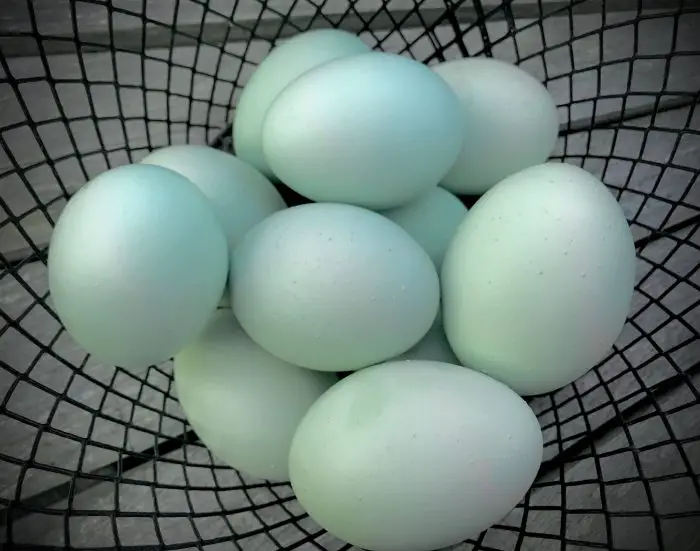
A farm fresh blue egg tastes the same as any other farm fresh egg. What can change the way an egg tastes is the way in which the hen that laid it was raised. When the conditions in which the hen was raised is optimal, she is going to produce an egg that is nutritionally better for you. Many people swear that farm fresh eggs taste much better than supermarket eggs.
Hens that are allowed to free range are able to eat all kinds of leafy greens, scratch the ground and eat bugs which will make her eggs so much better for you than a factory raised hen that isn’t allowed to free range and is fed a pellet diet.
The difference is apparent the second you crack an egg open. Hens that are raised in optimal conditions will produce an egg that has a deep orange yolk, compared to a factory raised chickens that produce a much paler yellow yolk.
Are Blue Eggs Safe to Eat?
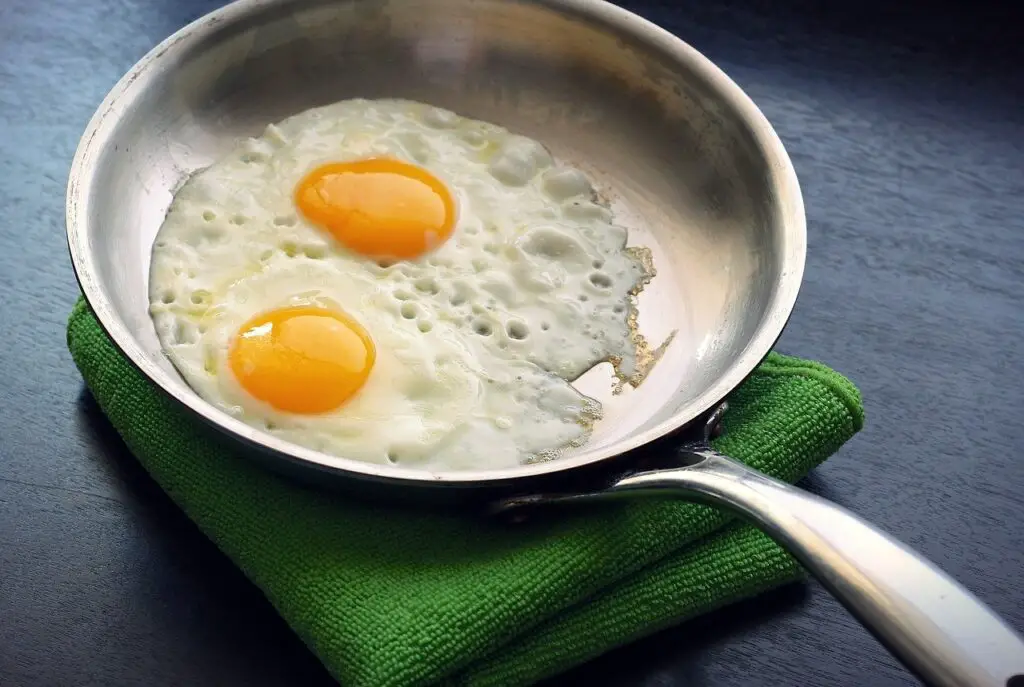
Blue eggs are completely safe to eat. The egg shells of an egg do not change the nutritional content of the egg at all. When you crack a blue egg open, the contents looks just the same as a brown, green or white chicken egg.
Are Blue Eggs Healthier?
The color of the egg does not make an egg any healthier. The conditions in which the hen that laid it can make an egg healthier for you. Chickens that are allowed to free range are exposed to plenty of sunshine (Vitamin D), eat all kinds of little bugs (protein) and leafy greens. This is what will make an egg healthier for you.
So, in most circumstances you can say that farm fresh eggs are nutritionally better for you. That is if they have been fed a healthy diet and exposed to plenty sunshine. Below is a chart that shows you how farm fresh eggs are nutritionally better for you than supermarket eggs.
| FARM FRESH EGGS |
|---|
| ⬆️ VITAMIN D |
| ⬆️ VITAMIN E |
| ⬆️ VITAMIN A |
| ⬇️ CHOLESTEROL |
| ⬇️ SATURATED FAT |
| ⬆️ BETA CAROTENE |
| ⬆️ OMEGA-3 FATTY ACIDS |
| THICKER SHELLS |
| RICHER YOLK |
THAN FACTORY RAISED CHICKEN EGGS.
Conclusion: 6 Best Breeds that Will Lay Beautiful Blue Chicken Eggs
| 6 BEST BREEDS THAT WILL LAY BEAUTIFUL BLUE CHICKEN EGGS |
|---|
| AMERAUCANA |
| CRESTED CREAM LEGBAR |
| EASTER EGGER |
| ARAUCANA |
| WHITING TRUE BLUE |
| ARKANSAS BLUE |
Adding some shades of blue chicken eggs to your daily egg collection is sure to make your basket a beautiful sight to see! Which breed of chicken do you prefer for your blue chicken eggs?

